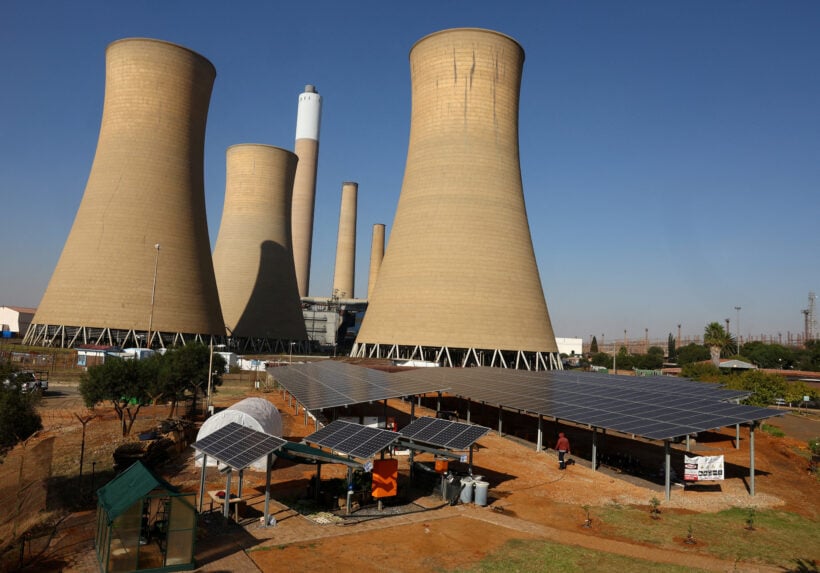
JOHANNESBURG, Jan 24 (Thomson Reuters Foundation) – Inconsistent government and corporate climate strategies may see poorer regions left behind in the transition away from polluting industries to green jobs, according to new research.
Wealthier cities like Durban, Cape Town and Johannesburg, have more advanced plans to cut emissions and adapt to climate impacts than less affluent regions, said the analysis of more than 50 government and corporate entities by South African non-profit SouthSouthNorth (SSN).
“If poorer provinces are left behind, the socio-economic divide will widen, disproportionately affecting vulnerable groups such as miners, informal workers and women,” said Samson Mbewe, an SSN project lead.
The northeastern province of Mpumalanga, for example, is the heartland of South Africa’s coal production. The closure of coal plants there could lead to sharp rises in unemployment if new green jobs do not fill the void, Mbewe said.
The country’s new Climate Change Act requires all levels of government to align their policies and actions with its goals of a low-carbon economy through, for example, setting and mandating greenhouse gas emission targets for companies.
But the analysis of these entities showed significantly different levels of preparation, a discrepancy that could lead to the regions with already high levels of unemployment being left behind when it comes to new jobs in the clean energy economy, the report warns.
South Africa is Africa’s most industrialised nation, with more than 80% of its power drawn from its coal reserves, according to the Department of Mineral Resources and Energy. It is also one of the top 15 greenhouse gas emitters worldwide, ahead of France and Britain.
In 2021, South Africa became the first country to accept the Just Energy Transition Partnership (JETP) deal in which richer nations pledged $8.5 billion to accelerate the country’s shift away from coal to renewables, while protecting local employment.
The term “just transition” refers to ensuring job creation in clean energy sectors as countries phase out polluting industries and move towards renewable energy, according to the presidential climate commission.
South Africa’s vast areas of sun-soaked land make it ideal for renewable energy projects that promise new jobs in a country suffering from 32% unemployment.
But communities are nervous that this type of work may be scarce and struggle to replace coal sector employment of some 90,000 people.
CLIMATE CHANGE ACT
South Africa’s Climate Change Act was signed into law in July last year, but the SSN analysis found multinational firms and different layers of government had all made varied levels of progress.
“Our analysis of the climate plans of the key engines of South Africa’s economy reveals a patchwork of different approaches to achieving a fair, people-focused transition,” said Camilla Hyslop, data lead at Net Zero Tracker, a report partner.
Some companies’ climate strategies make broad, sweeping pledges linked to achieving net zero emissions by 2050, but lack any wording around local employment and decent wages that need to be protected in the process, the analysis found.
“Some companies entirely overlook the need for a transition – just or otherwise,” Hyslop said.
The SSN analysis also found that the major cities were surpassing provincial climate policy strategies, which should learn from successful city actions.
For example, Durban’s plan goes into detail about reforestation projects that it says will help capture carbon.
But Kwazulu-Natal province, where Durban is found, speaks little about new, clean jobs that could replace those lost in polluting sectors such as petrochemical industries.
Less affluent, coal-dependent regions found in Mpumalanga have no formal net zero targets with no long-term structured plan on how the transition away from coal will take place.
PATCHWORK PLANS
The analysis recommendations include creating committees between different levels of government to better align climate plans, increased funding and technical support for poorer regions and incentivising companies to adopt robust transition plans.
Coordination between different government tiers would tackle a “missed opportunity” for provinces to draw inspiration from cities’ climate plans said Ian Steuart, a senior economist at the Trade and Industrial Policy Strategies (TIPS).
But placing communities at the heart of these plans through bringing the policies to them in local forums is key, said Chantal Naidoo, executive director of Rabia Transitions, a South African transitions finance research and advisory non-profit.
“We work through civil society groups … saying to them, you need to help government understand what justice looks like at your level,” said Naidoo, who also worked on the JETP presidential investment plan.
(Reporting by Kim Harrisberg @KimHarrisberg; Editing by Jack Graham and Jon Hemming. The Thomson Reuters Foundation is the charitable arm of Thomson Reuters.)

